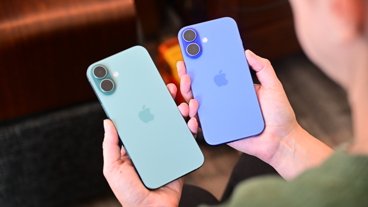As rumored, AT&T on Monday quietly rolled out iPhone plans for business customers, marking the first time it has authorized use of the Apple handset with discounted corporate wireless accounts.
New Corporate Responsibility Users and other corporate-liable users (CRUs) must then activate an eligible voice service plan for iPhone and an Enterprise Data Plan for iPhone.
Meanwhile, existing CRUs with iPhone-eligible voice service can keep their current corporately-discounted voice plan, but must tack on one of AT&T's Enterprise Data Plan for iPhone, which will replace any existing data plan.
Enterprise Data Plans are essentially offered at a $25 premium to those offered to residential customers, starting at $45 for unlimited data and 200 SMS messages, and scaling up to $65 for the plan that includes both unlimited data and SMS messages.
For a limited time, however, AT&T is offering a rolling $25 monthly discount for certain Qualified Corporate Responsibility Users and other corporate-liable customers, which brings the cost of the data plans back inline with the residential data plans.
Those who qualify for the offer must activate an Enterprise Data Plan for iPhone by March 31, 2008 in order to receive the service credit in the amount of $25 per month through December 31, 2008.
"To receive the recurring monthly credit, qualified users must maintain and be active on both an Enterprise Data Plan for iPhone and an eligible voice service plan at the time each such credit is applied or the credit will be forfeited," the carrier said. "It may take up to two billing cycles after activation for the first monthly credit to appear on qualified invoices. Offer not available to Individual Responsibility Users."
iPhone activation for business account holders appears to follow the same process as activation for residential users, requiring only a computer running iTunes with internet access.
 Slash Lane
Slash Lane









 Charles Martin
Charles Martin
 Mike Wuerthele
Mike Wuerthele
 Marko Zivkovic
Marko Zivkovic
 Malcolm Owen
Malcolm Owen


 William Gallagher
William Gallagher
 Amber Neely
Amber Neely


-m.jpg)






12 Comments
Can someone explain why anyone would want to use the much more expensive business plan? Does it save money on shared phone minutes?
Until the iPhone can sync with Exchange without the use of IMAP, this doens't really mean much for buisnesses.
Can someone explain why anyone would want to use the much more expensive business plan? Does it save money on shared phone minutes?
Maybe because it allows someone else (your employer) to pick up the tab?
And employers may indeed be willing to do this, because their own administrative costs are MUCH higher to reimburse individual employees for their phone service that the pro-rated per-user amount of the administrative costs if they (the company) can pay for the service for multiple users at a time (i.e., in bulk). In fact, many employers won't even allow individual's to expense their mobile phone service on a one-user-at-a-time basis, because the admin overhead is so high.
The remaining question, in my mind, is whether companies will now be able to apply any kind of corporate discount rate from AT&T to iPhone service for their employees.
Paul
Until the iPhone can sync with Exchange without the use of IMAP, this doens't really mean much for buisnesses.
Well, apart from those businesses whose employees are part of the 130 MILLION users of IBM's Domino/Notes services (for which IBM announced iPhone, iTouch, and Mac support in the past couple weeks). Or are a business whose IT staff can figure out that using secure IMAP is actually a very sensible option - even on Exchange. Or are a business that otherwise doesn't use Exchange. Or are a business that uses one of the (growing) number of service bureaus that provide relay services for iPhones to connect to Exchange. Or ... \
Paul
Will the business accounts actually get higher priority data access, like the Blackberry, or is it just an inflated price? The reduced cost of my service by dropping BES was what made the iPhone pay for itself... although I am disappointed with data speed and reliability compared to the Blackberry...